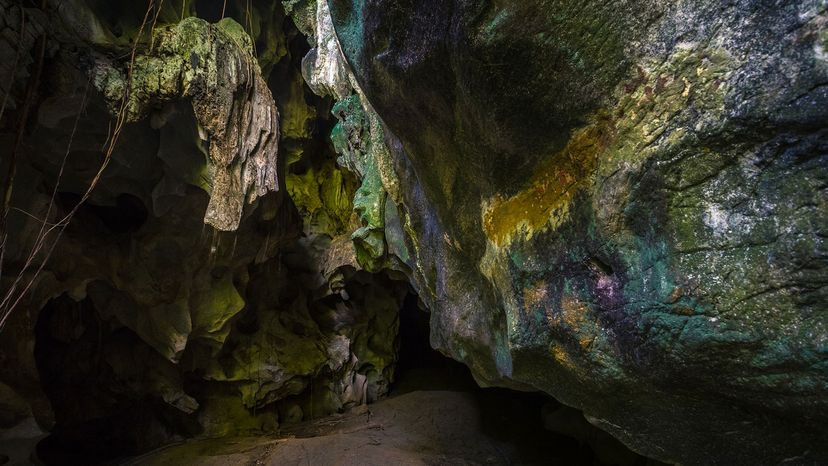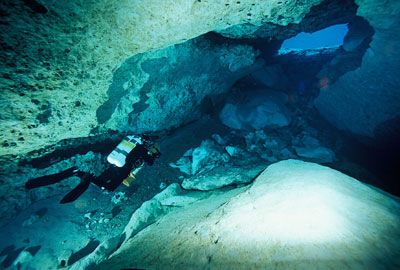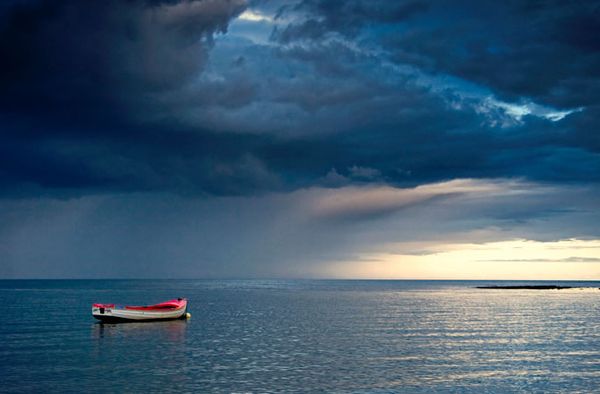
Anyone who's been to Carlsbad Caverns in New Mexico or the Cave of the Crystals in Mexico understands the pull of underground exploration. Yet each year, magical underground mazes claim the lives of experienced spelunkers and cave divers alike. Among the hazards: falling, pockets of toxic gases, getting lost, tumbling rocks, hypothermia, dehydration, or perhaps the most horrifying: Getting stuck in the jaws of tight sharp rocks, slowly succumbing to thirst and hunger in a pitch-black grave. Or maybe that was just a nightmare we had once after watching "The Descent."
In July 2018, the world waited breathlessly for updates on 12 young boys and their soccer coach, who were trapped in the Tham Luang cave in Chiang Rai, Thailand. The made-for-TV drama underscored the incredible magnetic draw of caves, and the potential dangers they present.
Advertisement
How would you ever survive being trapped in a cave, particularly if you were totally unprepared like the (extremely fortunate) Thai soccer team? Via an email interview, the pros at the National Cave Rescue Commission and the National Speleological Society offered an array of strategies you can use to stay alive down below.
- For starters, in any emergency situation your first step is assessment. Take a few deep breaths and don't panic. And whatever you do, don't go wandering through random passages hoping to find a way out, unless you're hoping to inspire a future horror movie script. Even expert cavers become disoriented in labyrinths.
- If you are completely disoriented, lost, and feeling panicky, stay put and realize that rescuers actually find the vast majority of lost cavers. If the idea doesn't terrify you, consider turning off your light once in a while to conserve the battery. To attract rescuers, you can knock rocks together (instead of screaming endlessly in terror like we would), and these sharp sounds often travel farther than your hoarse voice, anyway.
- If it's cool and you have extra clothes, now's the time to put them on, because you won't be moving around a lot. If you have plastic bags or a trash bag, make a hole for your head and put the bag over the rest of your body. This will keep you warm and dry. Conserve your energy. Nibble on a snack and drink some water (assuming you have some) to keep your brain clear, but ration them for later, too.
- If you think you might know the way out, you can use small bits of fabric or paper, or even little rock piles, to mark your current location. Then, check to see if you left behind any foot or handprints on your way in. Walk or crawl — slowly and calmly — looking for the exit, leaving a trail of items to mark your path. If you suspect that you've hit a dead end, use your homemade trail to return to your original starting point with confidence.
- If you feel small air currents (or detect them using the flicker of a lighter), you may be able to pinpoint a passage that leads to the surface. Tossing a bit of fine dust can also help you determine a breeze's direction.
- When you're tired, try to avoid lying on cold rock, which will steal warmth from your body. And stay dry. Getting wet — from a ground pool or from sweat — can lead to hypothermia, so slow down and keep your heart rate low.
- Hear dripping? You might be able to locate water. Not all cave water is entirely safe to drink, but in an extended emergency, you're going to need hydration. Damp cave walls may provide a bit of moisture, and the rocks act as filters of sorts. Flowing water is typically safer than stagnant or muddy water, but as with surface water, you should regard it with suspicion. Avoid water with a strong odor if you can.
- Near a cave entrance, you might find bugs, bats, fish, and birds to eat, but they're very hard to catch, and the energy you expend in vain trying to catch them may cost you more calories than you gain. Deeper in the cave, you'll find no food at all, and Domino's definitely does not deliver to the Pit of Doom. You may be comforted to know people can survive 30-40 days without food, as long as they have water to drink.
Finally, here are some precautions to lessen your chances of misadventure: Never go caving alone — four people is really the bare minimum in case of emergency — and always, always tell someone on the surface where you're going and when you expect to be back.
Advertisement

